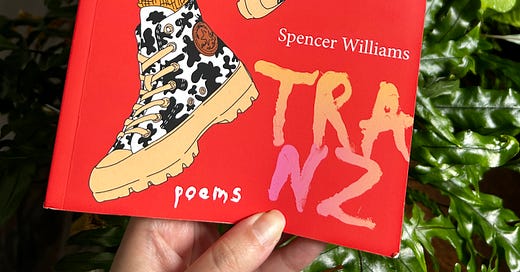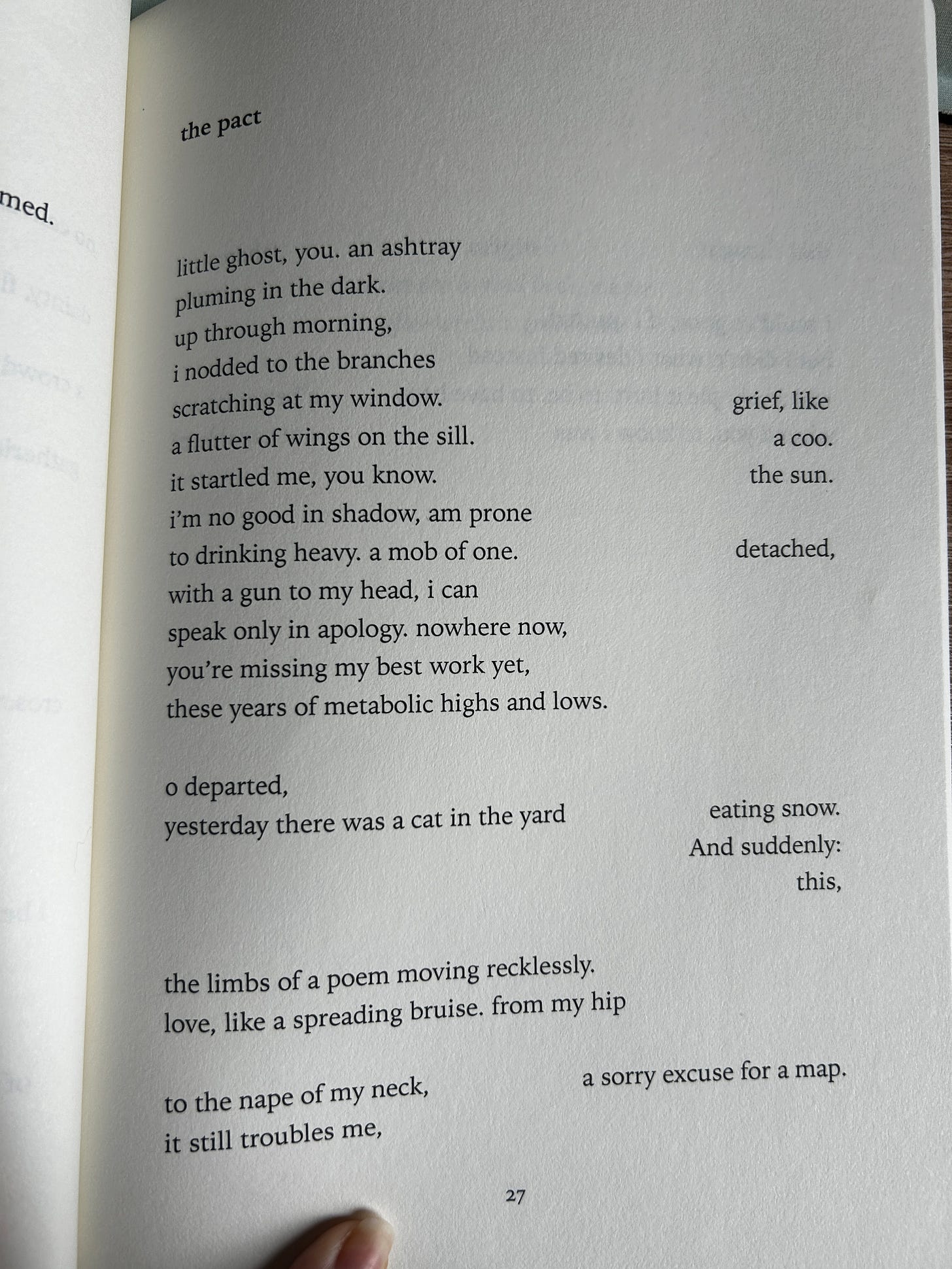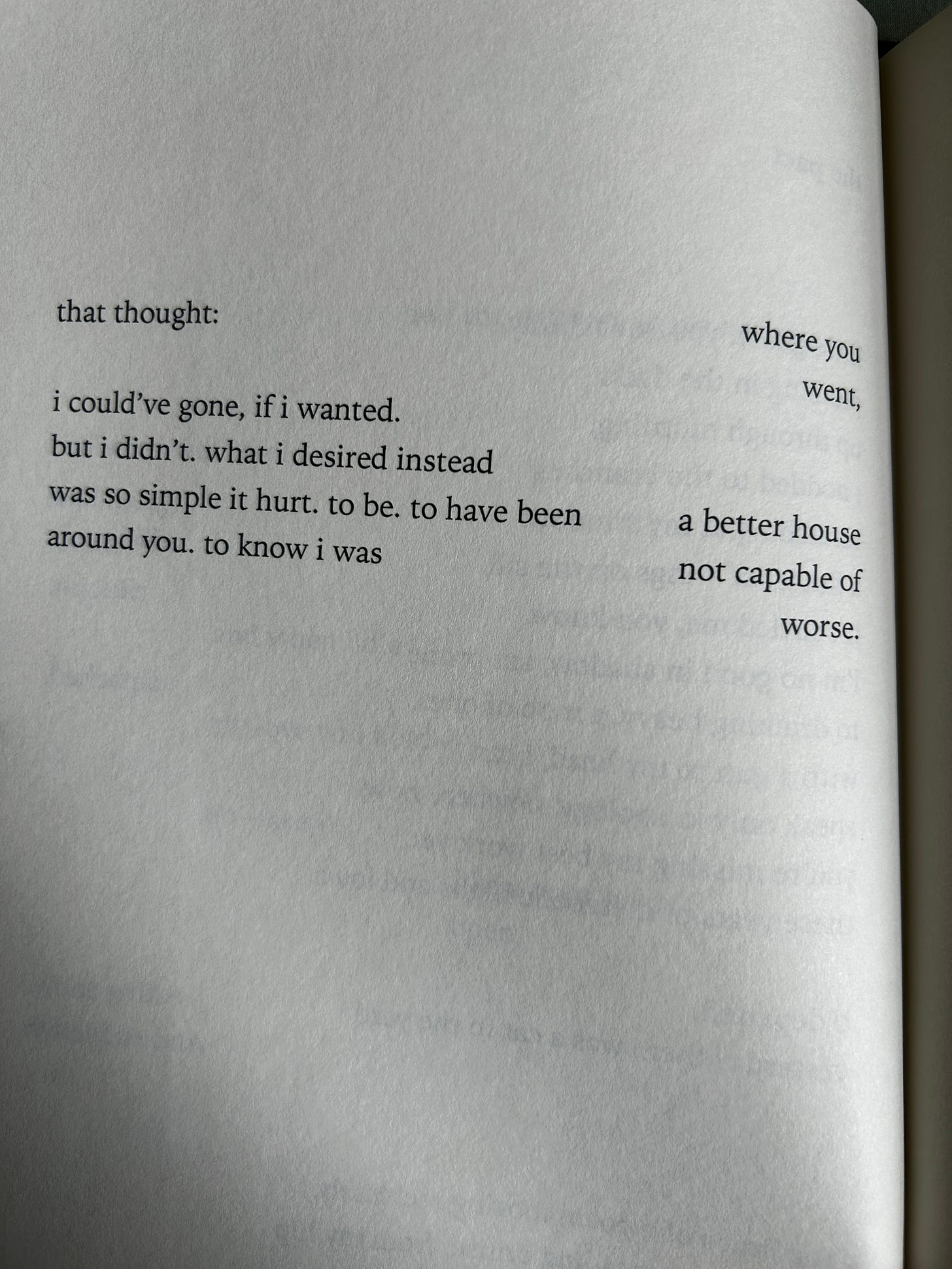📝 Thanks for reading Fran Magazine, a biweekly blog by Fran Hoepfner (me). The way this works is that Wednesday (regular) issues are free for all and Sunday (dispatch) and reread diary issues are for paid subscribers only. Consider subscribing or upgrading your subscription for access to more Fran Magazine, and feel free to follow me on Instagram or Letterboxd. 📝
My first memory of my MFA pal Spencer Williams was that she reply-alled to an email that no one needed to reply-all to. My second memory of my MFA pal Spencer Williams is that I once shit-talked “whoever it was who couldn’t figure out how to reply to an email” to her face and she said “oh, but that was me” during our first-ever hangout. This has more or less been our relationship for the past six (!) years as we’ve gone from taking long Jersey City walks to covering NYFF together to long-distance antagonism while Spencer pursues a PhD in Buffalo.
On Sunday, Fourway Books released Spencer’s debut poetry collection TRANZ. I asked Spencer if she wanted to talk to the illustrious Fran Magazine about working on this book and the font Garamond, to which she said “omg yes.” Our conversation below has been condensed and edited to not make Spencer sound like Dr. Roberta Bobby.
Hi Spencer.
Hi Fran!
Congratulations on your poetry debut, TRANZ. How are you feeling about the book being out in the world and about writing poetry in general? Not to start with, like, “state of the world,” but…
I’m horrified, genuinely. Like, my mom will read it and be like. “What does eating ass mean?” and then I’ll have to tell her. But I’m also preparing myself for what one of our beloved MFA instructors called “The Great Silence” — that moment when your book comes out and no one gives a fuck. In a way, it’s kind of liberating to think about this book existing in the world with a shrug. It certainly won’t be winning any awards.
I wrote most of these poems pretty quickly during COVID, and so they definitely feel less labored over than, say, my unpublished MFA thesis which I agonized about and revised constantly for two years. The swiftness with which I wrote TRANZ makes it easier for me to let go. I don’t feel too precious about its life beyond the nest, which I think is healthy. Though obviously I do care that people I care about like it. But even if they don’t, a flop era can be iconic. I’d get a lot of mileage out of a flop era.
Okay, well, now I’ll have to explain to my mom what “eating ass” is. I promise we’ll get into your poems in a second, but something I’ve always admired about your “process” (gag), and something we share as writers is that we both write fairly quickly. Whether this comes from rampant AIM use in our youth… who’s to say… but what do you think that writing a poem thirty minutes before class actually does or did to help your creative process?
Not you outing me for being lazy at workshop... There’s a kind of electricity (cringe) that strikes the rushed poem on account of not having time to be precious about images or grammar or even concept. I love writing up against a deadline. I find I can’t really produce things unless I feel a certain level of anxiety. Speed helps me scrape the scum of my brain off and slap it onto another surface. This isn’t to say that I don’t consider things — that’s also where workshopping becomes especially useful. But the initial draft, for me, is always an exercise in projectile vomiting onto the ceiling to see what parts of my cultural diet stick.
One of the poems you sent along to discuss is called “if ur gonna be transphobic at least be funny.” The form of this poem kind of waves across the page — this is what I’ve come to think of as the traditional “Spencer form.” Can you talk a little bit about the look of the poem and why that’s a form you come back to?
I just truly like to see a full page of text. I get self-conscious when I write a poem that doesn’t take full advantage of the page in some way. Other poets are really good at these sparse little nuggets, but I love yapping too much for that to work for me. I guess “Spencer form” could be translated to yapping. And being “so random” with it.
I should say, I stole the conceit of that poem from my writer friend Madeline Mori — basically you use the Merriam Webster Time Traveler tool to find the words entered into the dictionary the year you were born, and then incorporate them into the poem. Some of my words (1995… I’m an elder) were a bit loco. So what emerges from that prompt are a bunch of incongruous words that I somehow had to sew together. I make my creative writing students do this all the time.
Well, for all that you claim to yap, I found the poems in this collection a little sparser than work I’ve read of yours in the past. You’re doing less but saying more. Were you conscious of this when you were writing?
Maybe? In the past, I’ve been really interested in capturing these tight little frames where maybe a brief scene could unfold, or where I could spend time ruminating on an object. For this manuscript, I gave myself permission to be a bit messier, and to end poems parallel to my thoughts. So if I felt myself losing steam, the poem ended wherever that point was. I didn’t try to force closure where closure didn’t naturally appear, which is why a couple poems end with dashes instead of periods. I wrote the majority of these poems during lockdown months, so I think my attention was being pulled in a million directions with no clear destination and I think some of the poems, at least formally, reflect a scattered, possibly broken, perspective.
There’s a line in your poem “the pact” where you’re looking at a cat out the window, and it reminded me of a lot of the weird boredom that permeated that time — pervasive fear, sure, but also dullness. I get the sense in a lot of these poems that you’re writing from the POV of being kind of “over it.” Does that feel like a fair interpretation?
Absolutely. I’m over it in so many ways about so many things. The major thing I was stressed about that I finally had to be like “fuck it” was feeling the need to over-explain my gender identity to people, or make sense of it for myself in a way that pinned it down with a period. Now I’m like, this gender shit is funny and playful and meaningful but also meaningless. I love reading queer theory and trans theory stuff obviously, but on a personal level, I had to be like, there are bigger things to spiral about in the world and becoming the Hari Nef of Jersey City is not one of them.
Hari Nef is sort of the Spencer Williams of TV’s The Idol. Thoughts?
Big agree. Ruining a pop star‘s career for Vanity Fair is my dream gig. Causing drama from afar is a talent.
All lowercase poems is new for you too, right? Newish?
Yes! I’m drawn to lowercase stylistically for how it punctuates a sense of informality. Like, I’m just talking shit and nothing I say is serious enough to warrant a capital letter. I think, with poetry, a lot of emphasis is placed on the capital lyric “I” — an “I” that speaks but isn’t tethered to my perspective, creating a kind of distance between subject and observer. I also think there’s a tradition that says the speaker of the poem and the author are distinct from one another. In these poems, I was thinking of the lower-case “i” as a way to fold speaker and poet into each other, which is to say: these lines are absolutely from my POV and I do not have the luxury of distance or passive observation in regards to my trans experience.
The last poem you mentioned wanting to discuss is “this night too will end,” which is written after Against Me!’s album Transgender Dysphoria Blues. There’s a lot of other art mentioned in the book, some of it trans, some of it not. Do poems come to you as you engage with art outside of writing or is it more in reminiscing?
I love an ekphrastic poem. The one you’re talking about is a bit different because the album isn’t visual, but I’m writing towards it in a similar way one would a piece of art in a museum. I love that album. It’s one of the oldest poems in the collection too—I put it in my thesis manuscript but I’m glad I decided to put it here. I think its erratic quality fits well within the scope of this book.
When I’m in a funk or a fog where I can’t seem to get anything out, I always turn to art as a means to re-spark. This is so basic but I do really love the dialogues that can be had across genres and mediums.
Last big question: you granted me pretty prominent placement in your acknowledgements section. How specifically do you think I impacted this book?
TRANZ would not exist without Fran Hoepfner, honorary transsexual fish icon.
Okay. Do you wanna do some rapid-fire questions?
Hit me!!
What was the song of the summer?
That’s tough.
You have to pick one.
“New Woman” by LISA feat. ROSALÍA. Wall-to-wall banger. Makes the produce aisle feel like a runway. Two queens maximizing their joint slay.
Wow, just like us. What font do you type your poems in?
Garamond, duh.
Follow-up: is Garamond overrated?
Literally no.
What’s the most overshared Instagram poem?
I think we all kind of know.1
And last but not least, what’s next for you?
The Elden Ring DLC.
TRANZ is available to order here and you can follow Spencer on Instagram.
Weigh in on Garamond below.
In a private text, Spencer and I confirmed we were thinking of the same one, which we will reveal privately to others… elsewhere… though you’re welcome to make a guess in the comments.







we do all know which one
I like Garamond…a little too skinny and frail to truly bear the weight of a snappy line of dialogue or anything fragmentary but extended lyrical passages of description in Garamond…that’s my shit…give me your rounded hills and your warm meadows encased in all those tiny serifs…